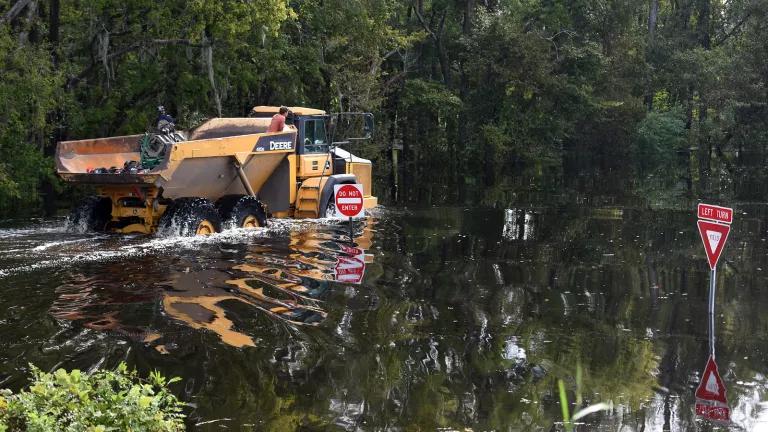Undisclosed Flood Damage Financially Soaks Home Buyers
Across the United States, the majority of states lack laws that require flood damages be fully disclosed to home buyers. The consequences can be financially ruinous to those who unwittingly purchase a flood-prone home.

Flooding in Nashville, Tennessee
Across the United States, the majority of states lack laws that require flood damages be fully disclosed to home buyers. The consequences can be financially ruinous to those who unwittingly purchase a flood-prone home.
A new study by Milliman, an independent actuarial consulting firm, found that a home buyer can incur tens of thousands of dollars in flood damage costs over the course of their mortgage, if they purchase a previously flooded home. The study assessed the potential impact of prior flood damage to home buyers in New Jersey, New York, and North Carolina. Like most states, these states have disclosure laws that fail to inform people about past damages, insurance costs, and other important information a buyer should know.
States with no or weak flood risk disclosure requirements are hurting home buyers there. This must change. Home buyers must have the right to know whether their dream home is a potential nightmare.
Undisclosed Flood Damages Cost Home Buyers Tens of Thousands of Dollars
Floods are costly. According to Milliman, in New Jersey, New York, and North Carolina, 6.6 percent of all homes (28,826 homes) sold in 2021 were estimated to have been previously flooded. This represents average annual costs due to flooding of $16 million in North Carolina, $18 million in New Jersey, and $23 million in New York for these high-risk properties.
Milliman developed their estimates utilizing data from the National Flood Insurance Program’s OpenFEMA policy and loss data, as well as the KatRisk SpatialKat Flood and Storm Surge Models. Future flood damages were modeled by KatRisk under three different scenarios. The Standard scenario represents the current climate conditions. The Medium scenario is based on the Representative Concentration Pathway (RCP) 4.5 scenario, which is a reasonable estimation of what will happen, if on average, global economies are able to stabilize and begin to reduce greenhouse gases in the near term. The High scenario is based on the RCP 8.5 scenario, which is generally considered to be close to a worst-case scenario wherein global economies progress with a “business as usual” approach.

For the individual home buyer in North Carolina, the Milliman analysis found that over the life of a 15-year mortgage, the average buyer of a previously flooded home can expect to incur $18,164 in flood damages (see Standard scenario in graph above). Over a 30-year mortgage those home buyers should expect to incur $36,328 compared with homes that do not have a history of flooding
Climate change is expected to increase these flood damage costs for home buyers. In North Carolina, for example, the costs rise to $22,009 for a 15-year mortgage in the Medium climate scenario and $30,512 for a High Climate Scenario. For a 30-year mortgage, the costs are $44,018 for a Medium climate scenario and $61,025 for a High climate scenario.

In New Jersey, home buyers who purchase previously flooded homes can expect to pay, on average, $25,175 over the course of a 15-year mortgage and $ 50,351 over a 30-year mortgage. The costs rise to $32,707 for a 15-year mortgage in the Medium climate scenario and $50,756 for a High Climate Scenario. For a 30-year mortgage, the costs are $65,415 for a Medium climate scenario and $101,513 for a High climate scenario.

In New York, the costs are even higher. Home buyers who purchase previously flooded homes can expect to pay, on average, $46,887 over the course of a 15-year mortgage and $93,774 over a 30-year mortgage. The costs rise to $59,872 for a 15-year mortgage in the Medium climate scenario and $94,341 for a High Climate Scenario. For a 30-year mortgage, the costs are a whopping $119,774 for a Medium climate scenario and $188,683 for a High climate scenario.
Disclosing Flood Risks
Home buyers must have a right to know whether a home has flooded before they make what may be the biggest financial investment of their lives.
Given the high cost of flooding, states should not keep homebuyers in the dark about a home’s flood history. Strong real estate disclosure laws that require a seller to inform a buyer about a property’s flood history and risk would help address this problem.
As FEMA has stated in a recently released report on the lack of flood disclosure requirements in states, “disclosing flood risk information during real-estate is a timely and effective way to enable [home buyers] to make better risk-informed investment decisions.” FEMA has proposed that Congress amend the National Flood Insurance Act and explicitly require states to have flood disclosure laws. The agency is examining how they could impose this requirement through their regulations as well.
But regardless of what FEMA does, states have the power to change their own disclosure requirements -- and they should.
Home buyers cannot be expected to make good decisions if they are denied information. At a minimum, states must have disclosure laws that ensure that persons selling a property disclose the following information:
- Whether the home has ever been damaged by a flood and the extent of the damage;
- Whether the home is located in a floodplain and, if it is, the flood zone classification (100-year or 500-year) of the property and the source and date of this information; and
- Whether the seller and/or previous owners ever received federal disaster aid that would require all future owners to obtain and maintain flood insurance on the property and, if they have, the type of aid and amount received.
As sea levels rise and heavy rainstorms become more common, tens of thousands of communities can expect increasing vulnerability to flooding. Home buyers should not be kept in the dark about this risk when choosing where their family will call home.




